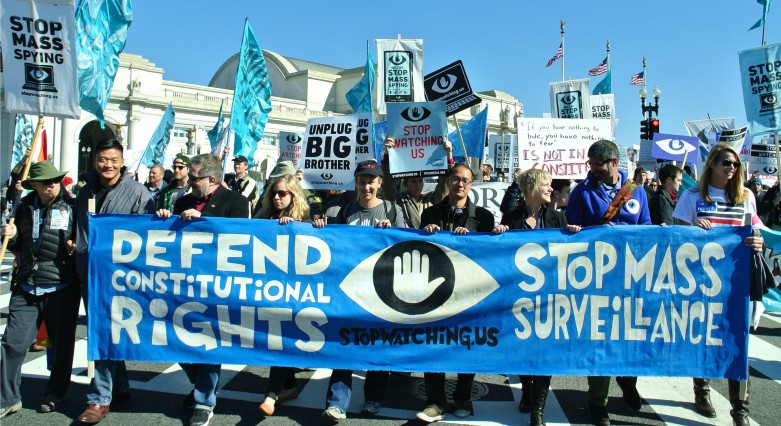
Two New Reports Show the Terrible Costs of NSA Surveillance
“It’s a terrible time to be covering government.”
“We say this every time there’s a new occupant in the White House, and it’s true every time: Each is more secretive than the last.”
“If the government wants to get you, they will.”
These quotes — from, respectively, NPR correspondent Tom Gjelten, AP Executive Editor Kathleen Carroll and Washington Post Pulitzer Prize winner Adam Goldman — say a lot about how the press is faring in the surveillance era. And a new report shows that the NSA’s unchecked spying programs have made it that much harder for journalists to do their jobs.
“With Liberty to Monitor All,” produced by Human Rights Watch and the ACLU, draws on interviews with 46 journalists, 42 lawyers, and both current and former senior government officials. The report’s conclusion: “Government surveillance and secrecy are undermining press freedom, the public’s right to information, and the right to counsel.”
The job of a good investigative journalist, of course, is to uncover the truth. To fulfill that mission these days, the report notes, many reporters feel compelled to take extra precautions:
Journalists increasingly feel the need to adopt elaborate steps to protect sources and information, and eliminate any digital trail of their investigations — from using high-end encryption, to resorting to burner phones, to abandoning all online communication and trying exclusively to meet sources in person.
Journalists expressed concern that, rather than being treated as essential checks on government and partners in ensuring a healthy democratic debate, they now feel they may be viewed as suspect for doing their jobs. One prominent journalist summed up what many seemed to be feeling as follows: ‘I don’t want the government to force me to act like a spy. I’m not a spy; I’m a journalist.’
To make matters worse, surveillance — and the fears it’s raised — have damaged the relationship between reporters and their sources. Many journalists, the report notes, say that “sources are becoming less candid over email and phone. … Sources are less willing to discuss sensitive matters, even where it is not clearly classified.”
These shifts are disturbing but not surprising. Journalists today have to contend not only with the impact of surveillance but with the Obama administration’s aggressive treatment of reporters like the New York Times’ James Risen, who faces a potential prison term for refusing to reveal a source. Who could blame a potential whistleblower for wanting to remain silent?
A report from the New America Foundation’s Open Technology Institute probes the broader implications of NSA surveillance. Surveillance Costs: The NSA’s Impact on the Economy, Internet Freedom and Cybersecurity considers how the spying scandal has hurt American business, damaged relations between the U.S. and other countries — and weakened Internet security.
You read that correctly: In the course of conducting activities designed to boost national security, the U.S. has actually made the Internet more vulnerable. “The NSA’s work to undermine the tools and standards that help ensure cybersecurity — especially its work to thwart encryption — undermines trust in the safety of the overall network,” the report notes.
And this is not just about eroding public trust; by exploiting security glitches in software and hardware, breaking encryption codes and hacking into networks, the NSA has undermined the stability of the Internet itself.
Both “With Liberty to Monitor All” and “Surveillance Costs” urge the U.S. government to safeguard Americans’ privacy rights and boost transparency about spying activities. Sen. Patrick Leahy’s version of the USA Freedom Act, introduced on Tuesday, is a step in the right direction.